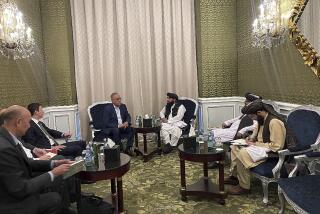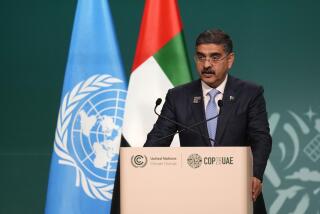Zaeef: Putting a face on the Taliban
- Share via
ISLAMABAD, Pakistan — On a tree-lined residential street in this capital city, where you can hear the sounds of children playing, there is another war being fought between the United States and Afghanistan.
It is the propaganda war. And the front lines are on the porch of the Afghanistan Embassy, where Afghanistan’s ambassador to Pakistan, Mullah Abdul Salam Zaeef, seeks to win the upper hand in the battle for the world’s sympathies.
Unknown before Sept. 11, Zaeef is now recognized by audiences around the world as the public face of the secretive Taliban regime.
His head wrapped in a black turban, his brave but often garbled and incomprehensible English, and his firm defiance in the face of the U.S.-led attacks on his country have made him a distinctive presence in this war.
“He’s not a trained negotiator,” said his friend Rahmin Ullah Yusefzai, executive editor of The News in Peshawar, Pakistan. “He’s not a diplomat. But for a country like Afghanistan, he’s OK.”
Zaeef, he said, is a shy man who is a stranger to all the attention he is receiving. Yusefzai first met Zaeef in the spring of 1995, when he was an undistinguished member of the Taliban. The Taliban appointed five or six ambassadors to Pakistan before settling on Zaeef a little more than a year ago, he said.
It is not clear what the Taliban saw in him, Yusefzai said. Zaeef lacks any special education, having never attended school other than a religious Islamic school, or madrassa. Perhaps, he said, it was Zaeef’s knowledge of English that got him the job.
“There is a dire shortage of English speakers in Afghanistan,” he said. “Anyone who can speak English has a bright future in the Taliban foreign service.”
During his first news conferences after the Sept. 11 attacks, Zaeef spoke in Pashto and relied on a translator, a large man with an eye patch who sat beside him. Perhaps the pictures published on front pages around the world of Zaeef accompanied by man-with-eye-patch proved too sinister.
In any event, Zaeef soon decided to do without a translator and speak English -- a risk most diplomats avoid. Usually, they prefer to speak through a translator unless they are fluent, unwilling to sound awkward or be misunderstood.
The combination of accent and faint voice makes the ambassador difficult to understand. Here’s a transcript from an Oct. 2 show of CNN’s Larry King Live:
Larry King: “If the proof were sent to Pakistan and Pakistan showed it to you, would you turn [Osama bin Laden] over? If you were convinced he was involved, would you turn him over?”
Zaeef: “We don’t -- we don’t want to follow the -- the other way. We want to [unintelligible] because Afghanistan [unintelligible] Afghanistan is independent country, and the nation is independent nation. This is not suitable by the -- by the [unintelligible].”
The ambassador faces other hazards besides encounters with a treacherous foreign language. His career was nearly cut short last week while visiting the Taliban stronghold of Kandahar on business. While meeting with Taliban officials, a bomb struck within 70 feet of him.
“He is under pressure. He has to go all the way to Kandahar to talk to the Taliban leadership because the phone lines are down,” Yusefzai says. “But he is a good man under pressure, a very strong man.”
Yesterday, Zaeef once again sat hunched over dozens of microphones and addressed more than 100 members of the news media on the embassy’s crowded front lawn. “With the passage of each day, the inhumane and brutal face of America is becoming naked,” he started in his light, quivering voice. “So far, 1,000 Afghan innocent civilians have been killed by American air raids. They include men, women and children.”
He went on to accuse the United States of bombing a 100-bed hospital in Herat as well as clinics and shops in Oruzgon province. “It is now clear that American planes are intentionally targeting the Afghan people,” he said, “and the goal is to punish the Afghan nation for having chosen an Islamic system.”
The accusations have become part of a familiar refrain by the Taliban. Zaeef portrays the United States as a bully, beating up on helpless but spirited Afghan civilians. At each news conference he presents claims of homes, hospitals, schools and other civilian targets being bombed.
There are few ways, however, to verify many of the Taliban’s reports. The Taliban expelled all Western media from their country soon after Sept. 11. So reporters must rely on eyewitness accounts from refugees and bits of information coming out from members of the local media.
Responses from the Pentagon to the accusations sometimes take hours. It also does not help that Pakistan is nine hours ahead of the East Coast. Washington is either sleeping or just waking up by the time Zaeef issues his statements.
In the meantime, the accusations, with disclaimers, are printed and broadcast until Washington issues its version of events.
It is difficult to tell which side is winning the fight for public support. But it’s clear that while the United States has every tool at its disposal to convince the world that this is a just war, the Taliban are expending little effort to get their message out.
The news conferences at the Afghanistan Embassy are rarely advertised, and there is often confusion among the staff about whether or when they will be held.
The embassy is a two-story concrete slab house with a black Mercedes parked in the back. A small loudspeaker tied with string to a branch of a tree in the front yard serves as an unreliable means to amplify Zaeef’s voice. The speaker was in the nook of the tree until it fell during one news conference, hitting a Japanese journalist squarely on the head.
But what Zaeef may lack in verbal clarity is offset by a sense of humor. Observers say he displays the ability to offer well-timed, folksy punch lines to reporters’ questions. Last week, he bristled at suggestions that the Taliban were involved in the anthrax-tainted mailings in the United States. “Anthrax?” he asked. “We don’t even know what anthrax is.”
His audience of journalists roared with laughter.
Yesterday, when an Australian journalist asked for Zaeef’s reaction to news that Australian special forces would be assisting the U.S. military in its campaign against Afghanistan, Zaeef replied:
“I think that America is a superpower. America is enough for Afghanistan. No need for Australia to join them.”
More laughter.
“There is a saying that all Pashtuns like a good gun,” Yusefzai said. “They like good food. And they like a good joke.”
More to Read
Sign up for Essential California
The most important California stories and recommendations in your inbox every morning.
You may occasionally receive promotional content from the Los Angeles Times.










